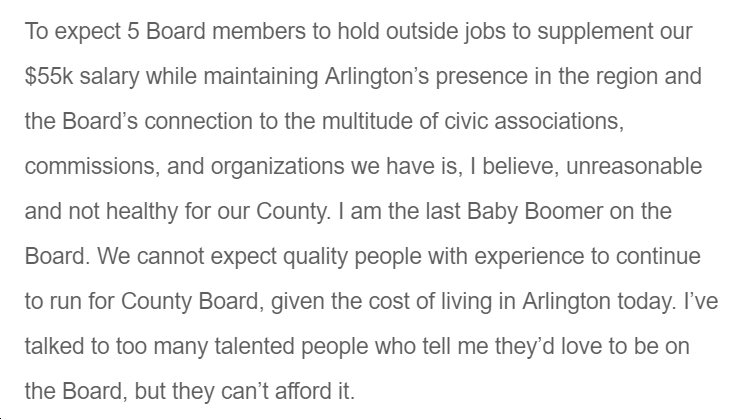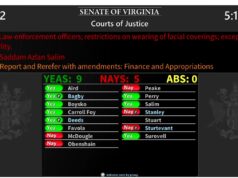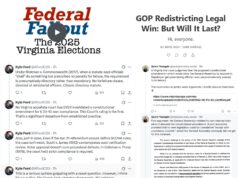I’ve had some major differences the past few years – mainly over the Columbia Pike streetcar project and also over her support for John Vihstadt – with Arlington County Board member Libby Garvey. In her latest email newsletter, though, I found myself strongly agreeing with her on this one.

Of course, this doesn’t just apply to Arlington, which is a county of around 220,000 people. It also of course applies to Fairfax County, with about 1.2 million people (plus a massive budget to go along with its massive population). And Loudoun County, with about 400,000 people (and a very large budget). And Prince William County, with nearly half a million people (and a very large budget). And Chesterfield County, with around 350,000 people (and a very large budget). And Henrico County, with over 300,000 people (and a very large budget). Etc.
It also, of course, applies to the Virginia State Senate and House of Delegates.
The bottom line is that it is absolutely absurd that top elected officials – whether on County Boards, City Councils or School Boards – in major jurisdictions, and also in the Virginia General Assembly: a) aren’t considered full-time, professional positions; b) aren’t compensated accordingly. The problems with continuing to act like we live in an agrarian, pre-modern, 18th-century world of “citizen legislators include:
- As Arlington County Board member Libby Garvey puts it, “We cannot expect quality people with experience to continue to run for County Board, given the cost of living…today.”
- I’d add that we also can’t expect people who aren’t independently wealthy and/or have the financial means, flexibility, etc. to take on jobs like these to run for office. Which means that most people simply can’t afford to put themselves forward for these important jobs. I’d argue that this isn’t just economically discriminatory, but also tends to skew the candidate pool older and less diverse than it would be and than it SHOULD be.
- It’s also important to note that most of these jobs, even if called “part-time,” can only be done well if they’re done on a full-time basis. I mean, seriously, do we really want a member of the Fairfax County School Board, which oversees an enormous budget and one of the largest school districts in the country, to have to hold down another job or jobs in order to make ends meet? Same thing in other jurisdictions and on other elected bodies. If so, why? Seems crazy to me.
- Another crucial point, IMHO, is that when we treat these important positions as low-paying, part-time gigs, we create a significant power vacuum. And, of course, vacuums tend to get filled. In the case of local government, they’re filled heavily by the bureaucracy, and almost certainly also by powerful, local economic interests (e.g., developers). Is that what we really want? In the case of the General Assembly, the vacuum gets filled heavily by powerful corporate interests, whether Dominion Energy or Verizon or whoever. Note that these corporations’ lobbyists are there year-round, 24/7 if need be, and are paid good money to be experts on issues impacting their respective industries. So, when our “citizen legislators” come down for a few weeks every year to deal with literally thousands of bills on every subject known to humanity – and about which they can’t possibly be expected to be experts – guess who is more than willing to “explain” the issues, bills, etc. to them? That’s right, the corporate lobbyists.
- Finally, I’d just note that in Virginia, which is basically the “Wild West” when it comes to campaign finance and ethics regulations/laws, the low salaries of public officials basically create the perfect conditions for corruption, whether it’s officially “legal” or not. Whether it’s local business interests donating to a County Board member’s campaign, perhaps just days before a major decision impacting that business is to come before the Board, or whether it’s Dominion Energy “capturing” General Assembly members, it’s a huge problem.
So how do we remedy this? I’d suggest a combination of: a) professionalization (in a wide variety of ways, including full-time work and higher pay) of the legislature and of local County Boards, School Boards, City Councils, etc; and b) enactment of MUCH tougher campaign finance and ethics laws in Virginia. Until we do that, we can expect a set of perverse, damaging, corrupting incentives to persist at the state and local levels here in Virginia. Talk about “pound foolish!”



![CNU Wason Center Poll of Virginia: Trump Approval at Just 34%; “narrow majority support a constitutional [redistricting] amendment”](https://bluevirginia.us/wp-content/uploads/2026/01/wason0128-1-238x178.jpg)







